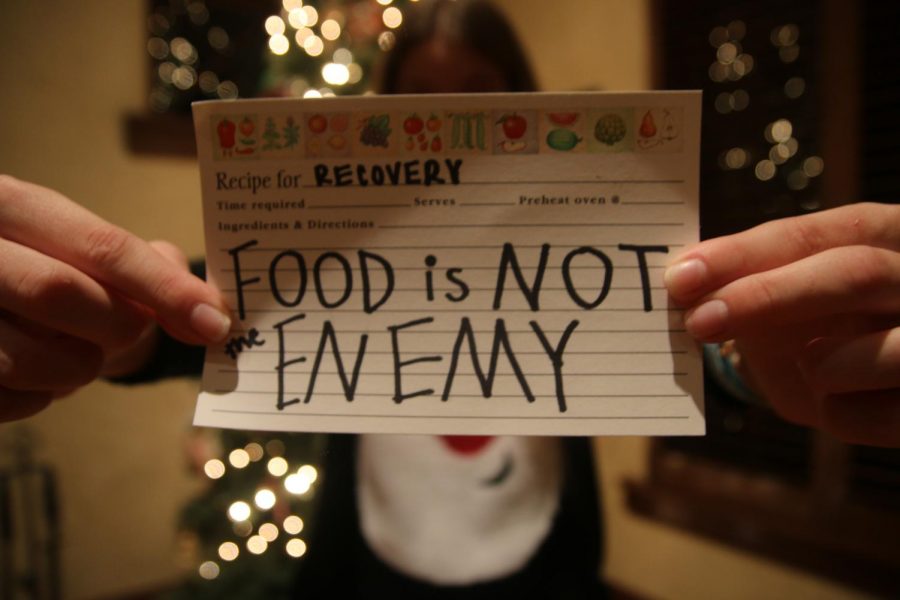Not So Happy Holidays
While the holidays are supposed to be a joyful time, they can be extremely difficult for those who struggle with eating disorders
Food is not the enemy; it can be a beautiful way to bring friends and family together.
From decadent Thanksgiving feasts to holiday parties to Christmas dinners to New Year’s resolutions, what is supposed to be a time of joy and fun can spiral into a time of panic and self-loathing for those struggling with or recovering from eating disorders. As someone who has struggled withdisordered eating in the past, I know from experience that the holidays can bring about extreme stress and anxiety, even if a person is considered recovered.
During the holidays, people are “faced with foods they haven’t had for a long time, foods they don’t get to enjoy on a regular basis, and larger amounts of it. These situations are more challenging and can tax the recovery skills of many. Each element that adds complexity or uncertainty to the en- vironment presents an additional challenge,” explains Lauren Muhlheim, psychologist and director of Eating Disorder Therapy LA.
However, we are not alone. Over 30 million Americans have an eating disorder, meaning that many people may have the same feelings during the holidays. It is important to band together and rely on support groups as well as friends and family during this time because it is supposed to be a time that focuses on what matters most to you in life, not a time to be obsessing over food.
“Identify who can be a support if you notice you are struggling, what coping skills you have used in the past to navigate challenges, and how you can practice them,” Muhlhiem continues.
Finding support from family and friends is one of the three primary coping skills therapists recommend during the holidays. Another one of the ways that they recommend is to plan for situations that may be stressful or triggering.
“I always suggest planning and preparing as much as possible. Have a plan for each situation. Think through who will be there, what the food environment will be, and how you can best manage it,” said Muhlhiem.
Feeling out of control is one of the feelings that often leads people with eating disorders to spiral out of control. Personally, the busyness of the holidays can be overwhelming and cause me to hyperfocus on the things I can control, such as food intake. However, this can also happen in the opposite way. During the holidays, people are surrounded by food, which can encourage those with binge eating disorders to deal with their stress by eating large amounts.
“Being around so much food was overwhelming. Because it was food that wasn’t available at other times of the year, I had this voice telling me to ‘eat it all, now!’” explained Ellie, a caller to the eating disorder helpline Beat, who has experienced different eating disorders over the past 14 years, including bulimia.
Finally, a crucial piece of advice that therapists recommend is for people to be kind to themselves during the holidays. It is okay to mess up and relapse and to eat foods that may be considered unhealthy.
“Food is not just fuel, it’s cultural, celebratory, and delicious. You are allowed to eat foods just because they are delicious or emotionally nourishing,” Whitney Catalano, a registered dietitian who specializes in patients with eating disorders.
Family members and friends have an essential role in supporting their loved ones with eating disorders during the holidays. Even if a person is not struggling themselves, they can still help by turning the focus away from food during holiday gatherings and instead focus on the relationships.
“I encourage people to be supportive and not to ask probing questions or give unnecessary advice,” said Ed Abramson, a professor emeritus at California State University.
If you or a loved one is struggling with an eating disorder, there is help available. Beat Eating Disorders runs a helpline over the Christmas period, from 4 p.m. to 8 p.m which can be found here. Also, the National Eating Disorders Association runs a helpline. While its helpline is closedon Thanksgiving and Christmas Day, they are available around that time. Alternatively, the Crisis Text Line is available in the U.S. 24/7.




